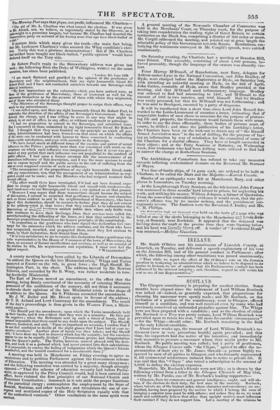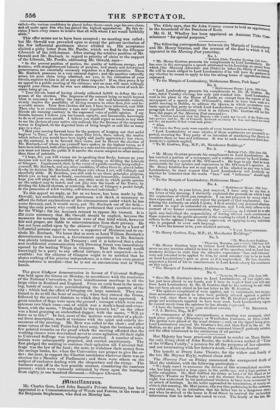SCOTLAND.
The Glasgow constituency is preparing for another election. Some months have elapsed since the retirement of Lord William Bentinek was talked of—indeed, so generally expected, that preparations for choosing his successor were openly made ; and Mr. Roebuck, on the invitation of a portion of the constituency, went to Glasgow, offered himself as a candidate, and was well received even by many who had previously conceived an unfounded prejudice against Jinn. The Whigs were not then prepared with a candidate ; and as the election of either Mr. Roebuck or a Tory was pretty certain, Lord William Bentinck was prevailed upon to retain his seat, " till more favourable circumstances" —for the Whigs—should arise ; Mr. Roebuck remaining in the field as the only Liberal candidate. About three weeks ago, the rumour of Lord William Bentinck's re- tirement (now in very precarious health) again prevailed ; and this time, his supporters had due notice of his intention, and immediately took measures to procure a successor whom they might prefer to Mr. Roebuck. No public meeting was called ; but a party of gentlemen, whom the Glasgow Courier calls "the Clique," agreed to offer the re- presentation of their city to Mr. James Oswald—a person highly re- spected by men of all parties in Glasgow, and who formerly represented it, till commercial mistbrtunes induced him to retire to private life. It was said that this " Clique " also raised a subscription to the amount of 3,0001. to defray the election expenses. Meanwhile, Mr. Roebuck's friends were not idle ; as is shown by the followinn.6 extract from a letter in the Glasgow Chronicle of May 31st, written by Mr. Purdie, one of Mr. Roebuck's leading supporters- " Glasgow, from its commerce and general intelligence, ought, and will ob- tain, if the electors do their duty, the best man in the country. Roebuck, whose talents are of the highest order, whose character and consistency are un- doubted, having been proposed by the section to which I belong, the onus of bringing a superior mom must lie with others ; and unless they do so, we must assert and confidently believe that other than upright motives must influence their conduct if they do not support him. Let a meeting of the citizens be called—the various candidates be placed before them—each urge his own claim, and all uuite upon him who has gained the highest approbation. By this de- cision I have every reason to believe that all with whom I act would faithfully abide."
This offer seems not to have been accepted ; no meeting was called ; but Mr. Oswald was prevailed upon to accept the private invitation of the few influential gentlemen above alluded to. His acceptance elicited a pithy letter from Mr. Purdie, which we find in the Glasgow Chronicle of the 10th instant. After stating the relative position of hlr. Oswald and Mr. Roebuck in regard to priority of claim to the support of the Liberals, Mr. Purdie, addressing Mr. Oswald, says- " In the present position of parties, the quality of boldness, energy, and decision, with straightforward honesty of purpose, and steady and determined perseverance, are essentially necessary requisites in a Representative. These Mr. Roebuck possesses in a very eminent degree ; and the question naturally arises, his prior claim being admitted, arc you, in the estimation of your friends, superior to him in all or any of these respects ? If so, then prove it by an appeal to a public meeting of the citizens; and no niau will more willingly support your claim, than he who now addresses you, in the event of such de- cision being given. 44 Your friends boast of having already collected 3,0001. to defray the ex- penses of the election. The largeness of the amount being so much beyond what is necessary to defray the expenses of a fair and honourable contest, clearly implies the possibility of having recourse to other than fair and ho- nourable means. Your first election did riot, I have been informed, cost 500/. Then why is so extraordinary a sum now required? Simply because your friends are running contrary to the expressed voice of public opinion. I. say friends, because I believe you too honest, upright, and honounible, knowingly to do so of your own accord. I believe you would regret as much as any man to see the electors of your native city reduced, like the freemen of the corporate towns in England, to the degraded state of being bought or sold like so many pigs in a stye. "Had your coming forward been for the purpose of keeping out that awful bugbear 'a Tory,' or to frustrate some Tory trick, their, indeed, the motive which induced you would have been highly and justly appreciated ; but when, on the contrary, it is to forward their views, and to thwart the election of Mr. Roebuck,—of whom you yourself have spoken in the highest terms, as I have been informed, both of his qualities as a man and his talents as a politician,— you must not blame the public if it ascribe the course adopted to other motives than those of patriotic. "I hope, Sir, you will excuse me in speaking thus freely, because on your decision will rest the responsibility of either uniting or dividing the Liberals of Glasgow. I again assert, that, in the event of a public meeting being called— yourself, Mr. Roebuck, and any other candidate, if other there be, placed before it—by its decision Mr. Roebuck, and those with whom I act, will willingly and cheerfully abide. If, therefore, you still wish to see those principles progress, which you so long and so firmly, consistently and honourably, maintained, I hope you will adopt this, or, indeed, any other mode by which public opinion on the subject may be tested, and not play into the hands of the Tories, by dividing the Liberal electors, or rendering the city of Glasgow a pocket burgh, in the possession of a few wealthy, self-interested individuals."
To this appeal no reply, as far as we know, has been made by Mr. Oswald; but undoubtedly, that gentleman will think .it necessary to afford the fullest explanations of the circumstances under which he has Come forward, and, it would seem, put Mr. Roebuck out of the field— being the only person who could have performed that excellent service
for the Whigs ; for Mr. Roe'etteic mused to oppose Mr. Oswald: It is _the rzsre necessary that Mr. Oswald should be explicit, because the measures for securing his election were of that kind which, however fair and proper, are liable to misconstruction from their privacy. He has not been called upon by the citizens of Glasgow, but by a knot of influential persons eager to return a supporter of Ministers and to ex- clude Mr. Roebuck. We know that as soon as Lord William Bentinek's determination was known, a Government opposition to Mr. Roebuck was plainly intimated at the Treasury ; and it is believed that a close and confidential communication with Downing Street was immediately opened by the leading Whigs in Glasgow. That Mr. Oswald would knowingly be a party to any official intrigue, is not suspected—is in- credible ; but the citizens of Glasgow ought to be satisfied that he abates nothing of his pristine independence, at a time when even greater independence is needful—that lie is not an unconscious tool in Whig bands.



























 Previous page
Previous page